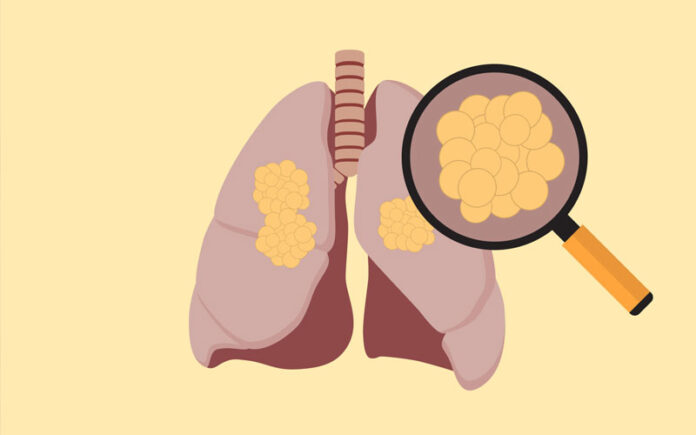Lung cancer is a type of cancer that forms in the lungs. There are two types of lung cancer, non-small cell lung cancer (NSCLC), comprising 80-85% of lung cancer diagnoses, and the other, small cell lung cancer (SCLC), is less common but the more aggressive form of lung cancer. There are three primary types of NSCLC and they are defined by the type of cells affected by cancer.
- Adenocarcinoma represents 40% of all NSCLC diagnoses and affects both smokers and nonsmokers. It tends to grow slower than other types of lung cancer, leading to better recovery rates.
- Squamous cell carcinoma, also called epidermoid carcinoma, is the second most common NSCLC, representing 25-30% of all NSCLC diagnoses. These cancers are more likely to spread to other areas of the body, making them more difficult to treat. There are more smokers that develop squamous cell carcinoma than any other type of lung cancer.
- Large cell carcinoma is a rare form of NSCLC, accounting for only 10-15% of all diagnoses. It can occur anywhere in the lung and tends to be aggressive.
Symptoms of NSCLC are common to all lung cancer and include the following:
- A cough that doesn’t go away or gets worse over time
- Coughing up blood
- Chest pain or discomfort
- Trouble breathing
- Wheezing
- Hoarseness
- Loss of appetite
- Weight loss for no reason
- Fatigue
- Trouble swallowing
- Swelling in the face and/or veins in the neck
The leading risk for developing NSCLC is smoking cigarettes. The more you smoke and the earlier in life you begin smoking, the greater your risk for developing NSCLC. Other risk factors include second-hand smoke, exposure to workplace carcinogens, radiation exposure, environmental pollution, family history of lung cancer, and previous infection of HIV.
A 2019 study found that Blacks with NSCLC had more mutational changes in their DNA than people of other ethnicities. However, one 2020 study stated there is no difference in NSCLC treatment and survival when Blacks and Whites receive equal access to treatment.
Early diagnosis offers the best prognosis for NSCLC. But NSCLC and other lung cancers can be difficult to diagnose because these cancers often have symptoms that are mistaken for common illnesses or the effects of long-term smoking. Annual screenings are therefore recommended if you are between the ages of 55 and 80 and have a long and heavy history of smoking tobacco.
Additionally, to detect certain types of NSCLC further genetic testing is required. This helps ensure the treatment is specific to your type of NSCLC. It is important to ask your healthcare provider about genetic testing for NSCLC and all treatment options available.
Treatment for NSCLC will depend on whether the cancer has spread to other areas of the body, your overall health and age, and the presence of certain proteins that make treatments more effective. If your NSCLC is detected early (before it has spread to other areas), surgery to remove the affected tissue or tumor is the treatment of choice.
Until recently, most non-small-cell lung cancers (NSCLC) were treated similarly, with therapies that destroy dividing cells (both cancer and healthy cells alike). Today, clinical research studies are evaluating the safety and efficacy of investigational medicines (with the goal of targeting certain mutations) to potentially treat NSCLC.
Blacks remain underrepresented in clinical trials despite reports suggesting greater incidence and deaths from locally advanced NSCLC. If you’ve been diagnosed with NSCLC, you can consider such clinical trials as Takeda Pharmaceutical’s Exclaim-2 trial, which seeks patients that are positive for an epidermal growth factor receptor (EGFR) exon 20 insertion mutation who have not yet been treated.
If you smoke, however, one of the most important things you can do to be ready for treatment is to try to quit. Studies have shown that patients who stop smoking after a diagnosis of lung cancer tend to have better outcomes than those who don’t.
This article is brought to you by Takeda.






